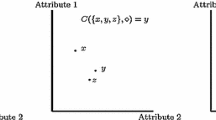Abstract
Herbert Simon has argued that economic agents do not maximise a transitive ordering but rather adopt what he calls satisficing behaviour. He argues that such behaviour is rational. This paper aims to provide a theory to support Simon's viewpoint. Because of social choice problems an individual with multiple objectives may find it impossible to construct a transitive ordering and hence may have to adopt satisficing type behaviour. We show that whether or not an individual adopts satisficing behaviour depends on the information available.
Similar content being viewed by others
References
Basu K (1980) Revealed preference of government. Cambridge University Press, Cambridge
Blair DH, Pollak RA (1982) Acyclic collective choice rules. Econometrica 50:931–943
Blau JH, Deb R (1977) Social decision functions and the veto. Econometrica 45:871–879
Boland LA (1982) On the futility of criticising the neoclassical maximisation hypothesis. Am Econ Rev 71:1031–1036
Broome J (1978) Choice and value in economics. Oxford Economic Papers, NS30, pp 313–333
d'Aspremont C, Gevers LC (1977) Equity and the informational basis of collective choice. Rev Econ Stud 44:143–163
Deb R (1981) k-monotone social decision functions and the veto. Econometrica 49:899–910
Herzberger HG (1973) Ordinal preference and rational choice. Econometrica 41:187–237
Kelsey D (1982) The role of information in social welfare judgments. Oxford Econ Paper (in press)
Kelsey D (1982) Topics in social choice. D. Phil. Thesis, Oxford
Kelsey D (1984) The structure of social decision functions. Math Soc Sci 8:241–252
Kelsey D (1984) Acyclic choice without the Pareto principle. Rev Econ Stud 51:693–699
Kelsey D (1985) Acyclic choice and group veto. Soc Choice Welfare 2:131–137
Mas-Colell A, Sonnenschein HF (1972) General possibility theorems for group decisions. Rev Econ Stud 39:185–192
May KO (1954) Intransitive utility and the aggregation of preference patterns. Econometrica 22: 1–13
Roberts KWS (1980) Possibility theorems with interpersonally comparable welfare levels. Rev Econ Stud 47:409–420
Roberts KWS (1980) Interpersonal comparability and social choice theory. Rev Econ Stud 47: 421–439
Sen AK (1970) Collective choice and social welfare. North Holland, Amsterdam
Sen AK (1979) Personal utilities and public judgments: or What's wrong with welfare economics? Econ J 89:537–558
Sen AK (1981) Plural utility. Proc Aristotelean Soc 81:193–215
Simon HA (1979) Rational decision-making in business organisations. Am Econ Rev 79:493–513
Suzumura K (1983) Rational choice, collective decisions and social welfare. Cambridge University Press, Cambridge
Author information
Authors and Affiliations
Additional information
I would like to thank Amartya Sen, the members of a seminar in Oxford, and an anonymous referee for their comments on previous drafts of this paper.
Rights and permissions
About this article
Cite this article
Kelsey, D. Utility and the individual: An analysis of internal conflicts. Soc Choice Welfare 3, 77–87 (1986). https://doi.org/10.1007/BF00435658
Received:
Accepted:
Issue Date:
DOI: https://doi.org/10.1007/BF00435658




